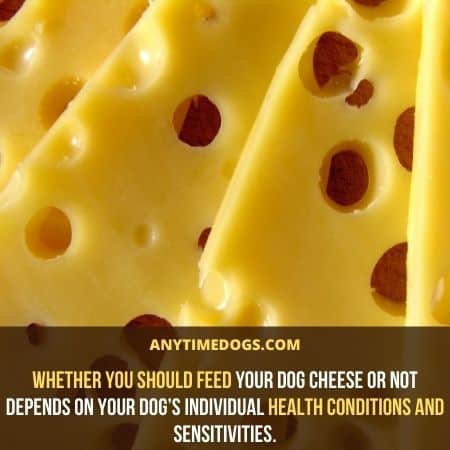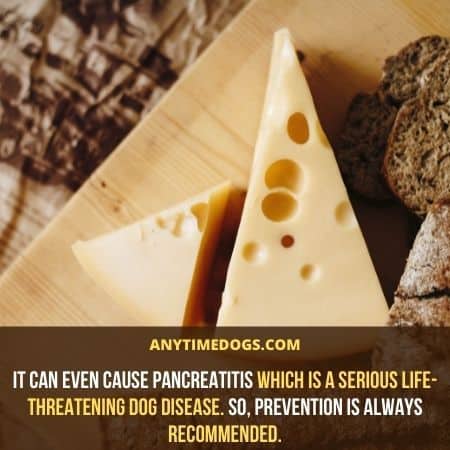Soft, supple, and textured. We all love to eat cheese and cheesy treats. So, did you just opened up a slice of cheese and your doggy put his eyes on it? You might have asked yourself can dogs eat cheese? Or is cheese even good for dogs? Am I right?
Well, yes! Dogs can eat cheese. Cheese alone is not toxic to dogs. It is a great source of protein, calcium, and omega-3. It is enriched in Vitamins A, K2, and B12.
While cheese is safe for dogs you should still keep a few things in consideration before offering your canine fellow a cheese chunk. In this article, I am going to tell you all the pros and cons of feeding your dog cheese.
Check out more articles on anytimedogs.com to see what other foods could be harmful to your dog including cream cheese, whipped cream, avocado, raspberries, mango, or cucumbers?
Can Dogs Eat Cheese? Is It Safe for Dogs to Eat Cheese?
A lot of pet parents claim that cheese is a great helping tool when it comes to training young puppies. But can dogs eat cheese too? Many dogs like to eat cheese but it should always be fed in a controlled amount.

Whether you should feed your dog cheese or not depends on your dog’s individual health conditions and sensitivities.
Benefits of Cheese To Dogs
Cheese is full of proteins, Vitamins A and B, and omega-3 fatty acids. Cheese is also packed with calcium, phosphorus, and zinc.
Here’s a fun suggestion! Cheese is great for hiding the medicine that your doggy refuses to take. Isn’t it great?
Pet trainers and Vets say that most puppies love to eat cheese. So, it can also be used as a motivational treat for your young doggy while behavioral training.
It is always best to feed your dog low-fat cheese such as mozzarella, cottage, or goat cheese. Never forget that moderation is the key to keep your dog healthy.
Cottage cheese is low in fat, sodium, and lactose. Low-fat cottage cheese reduces the risk of obesity and provides essential nutrients to your dog. While lower lactose content of cottage cheese reduces the possibility of intestinal problems.
Risks of Feeding Cheese to Dogs
Although it is safe to feed cheese to your dog, there are a few things to keep in mind. Cheese can also be bad for dogs. Let’s take a look at factors that make cheese a bad choice for dogs!
1. High In Fat:
Cheese is high in fat. Overfeeding cheese to your dog can cause weight gain and obesity. And obesity eventually leads to diabetes.
If your dog is already overweight or diabetic, then it is not a good idea to feed him cheese. You need to cut down calories by reducing unnecessary fats from your dog’s diet.

It can even cause pancreatitis which is a serious life-threatening dog disease. So, prevention is always recommended.
2. High In Salt:
Some hard cheese or those preserved for a longer time contains a lot of salt. If you feed such cheese to your dog in an excess amount, it can cause sodium poisoning.
Dogs should not consume salt in excess amounts. Many dogs can handle high sodium by drinking plenty of freshwaters. But you should always be cautious!
Symptoms Of Sodium Poisoning Include;
- Extreme Thirst
- Low Energy Level
- Vomiting
- Diarrhea
- Loss of Appetite
High sodium consumption is not good for dogs especially dogs with kidney issues.
3. Toxic Ingredients:
Moreover, some cheese also contains herbs and preservatives that are toxic to dogs such as chives, garlic, or onion. So, read out the ingredients carefully on the packet before giving cheese to your furry fellow.
4. Lactose Intolerance:
However, plain cheese is not toxic to dogs but all dogs cannot digest cheese. Even a small chunk can be problematic for dogs who are lactose intolerant.
If you don’t know about your dog’s lactose sensitivity, you can try feeding him a very small amount of cheese. Observe your dog for at least 24 hours to see how his body reacts.

If your doggy gets stomach upset or any gastrointestinal upset, you should consult a Vet. You should skip the cheese if your dog is lactose intolerant. However, you can still try low-lactose cheese such as soft goat cheese.
Which Types of Cheese Can Dogs Eat?
- Low-fat soft cheese such as cheddar and mozzarella in moderation
- Low sodium or homemade cottage cheese occasionally as a treat
- Plain low-fat cream cheese in moderation
Which Types of Cheese Are Bad for Dogs?
- High fat and processed cheese
- Cheese high in sodium
- Cheese that contains toxic herbs or preservatives
- Blue cheese that is ripe and moldy, can be highly toxic to your dog. If your dog ate blue cheese accidentally, vomiting, seizures, and diarrhea are the common symptoms. Talk to your Vet immediately if you observe any of these symptoms.
Can Dogs Eat Cheese? Conclusion:
So, yes! Dogs can eat cheese as an occasional snack. Cheese is not toxic to dogs but you have to figure out the right cheese for your dog. Read the ingredients and calories before feeding cheese to your dog.
Low fat and low sodium cheese are considered good for dogs such as cheddar, cottage, and soft goat cheese. Cheese can be fattening, so you should avoid overfeeding.
While cheese is great for training your dog and masking the medicine, moderation is still the key. If your dog is lactose intolerant, you should skip the cheese altogether.
Talk to your Vet before adding cheese to your dog’s diet and immediately call a professional in case of any worse symptoms.

